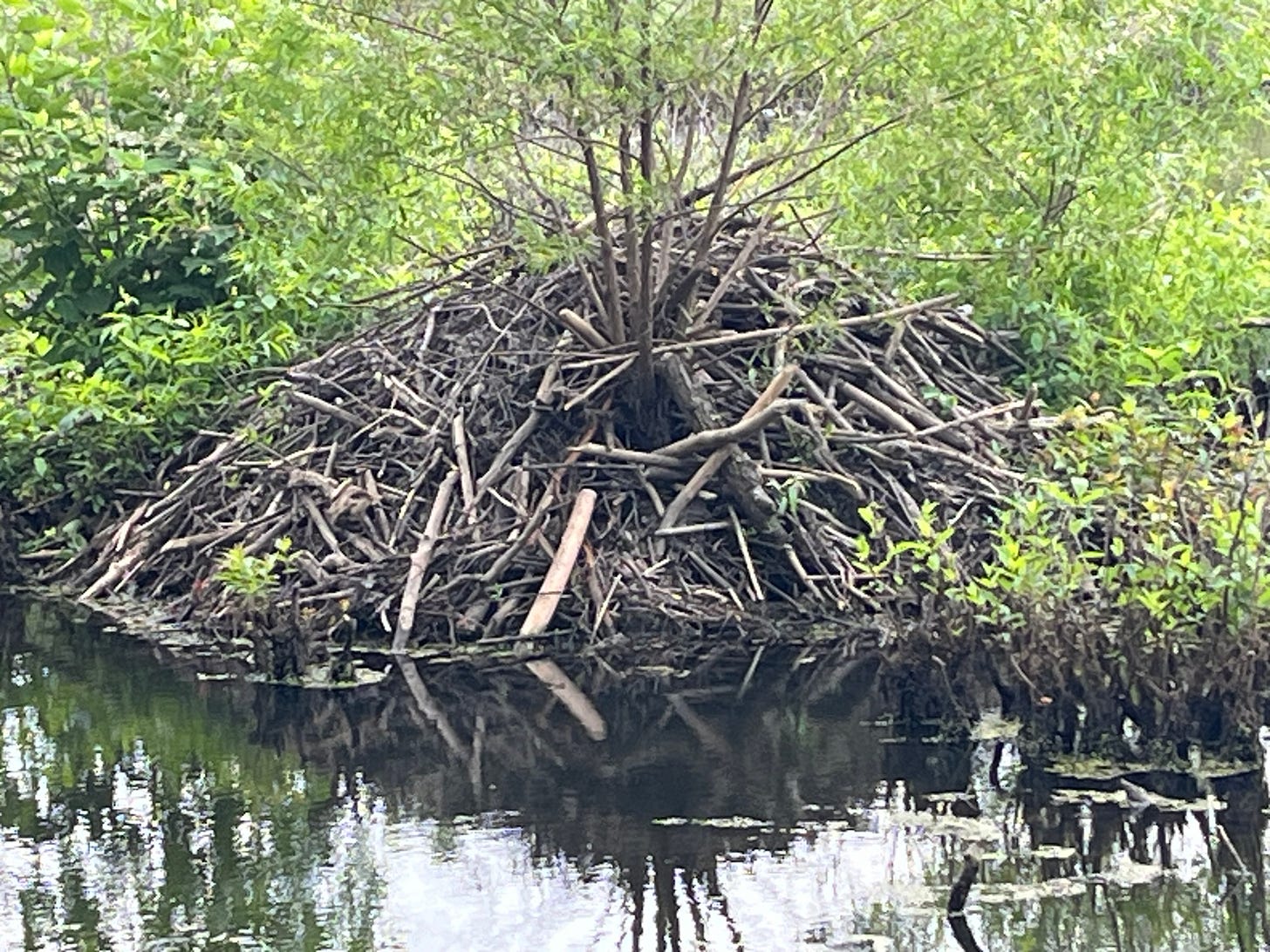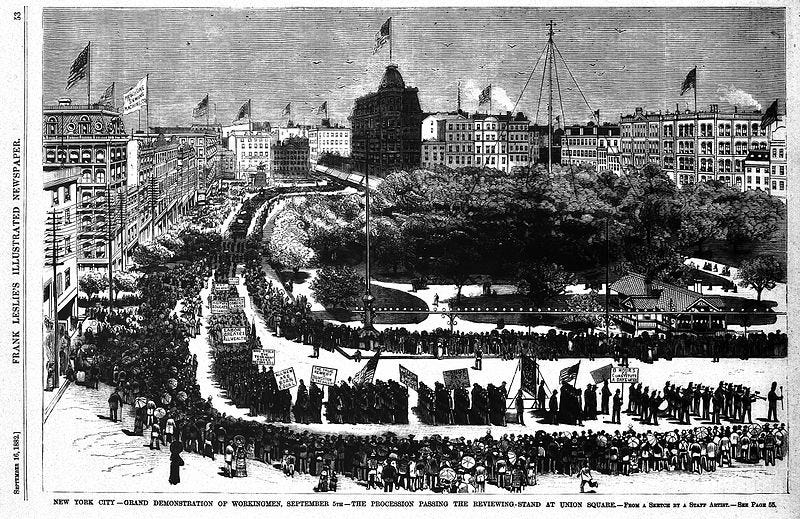Workers And The Environment
For Your Labor Day Reading
This post goes out to both free and paid subscribers, but if you are not already a paid subscriber and value this effort and our growing community, please consider upgrading to a paid membership. Thanks in advance for your financial support of my work —it’s what allows me to keep researching and writing!

In honor of the day devoted to the American worker, I’m sending out a short post (sans podcast), with a few articles that discuss the ideas behind Labor Day, and their intersection with workers and the environment.
— First up are a few articles about Labor Day that should help position us away from the weekend’s nonstop sales and allow us to at least think about its origins and the current importance of the American worker. Labor Day is about our ability to thrive (not just survive) together. Or as our current Vice President and Democratic candidate for president , Kamala Harris says, …she envisions an America where “everyone has a chance to not just get by, but to get ahead”.
— I’ll start with a bit of information and a photo from the Department of Labor on the history of Labor Day:
Labor Day is an annual celebration of the social and economic achievements of American workers. The holiday is rooted in the late nineteenth century, when labor activists pushed for a federal holiday to recognize the many contributions workers have made to America’s strength, prosperity, and well-being. … on June 28, 1894, Congress passed an act making the first Monday in September of each year a legal holiday.
https://www.dol.gov/general/laborday/history
And interesting commentary and illustration on the American Labor Day from the U.S. Embassy in Switzerland and Liechtenstein:
Unlike other U.S. holidays, Labor Day does not pay tribute to a person or memorialize a historic event. It gives voice to the American worker… The innovation surge that drove manufacturing during the 19th century had given rise to a “working class” of people employed by others — on others’ terms. By the late 1800s, poor working conditions were a source of social discord, especially in cities, where immigrants were arriving in large numbers… The labor movement stirred mixed sentiment in America, but many workers believed it offered a unified voice that would hasten improvements. Organized labor played a role in America’s social and cultural development — and in establishing protections for workers and the first notable commemoration of Labor Day.
— Next is a New York Times article from just a few days ago that highlights those farmers transitioning from factory farming animals to cultivating plants, and the benefits to both workers and the environment from this shift. The benefits are not just physical, like cruel “living” conditions and death for the millions of animals trapped in these factories and the resulting massive, air, water and soil pollution, but the workers’ vastly improved emotional health from leaving grueling, underpaid and viscerally cruel work. I saw first hand the unimaginable cruelty and devastating impacts on the environment from factory farming while working to regulate these facilities at the Ohio Environmental Protection Agency—it’s an experience I won’t easily forget. This is a must-read piece.
The work is physically grueling and many farmers earn incomes below the poverty line. The median net revenue for poultry farmers in 2022 was $9,367, according to the Department of Agriculture, and many farmers owe significant debt on their farm buildings.
Today Mr. Whitley [Tyler Whitley, who worked at a help line for farmers in financial distress] is director of the Transfarmation Project, an initiative of the charity Mercy for Animals that works to help people find a path out of factory farming. The group is working with a dozen farms, including one run by the Faaborgs, an Iowa family that traded raising hogs for growing mushrooms and was profiled this month in The Times. “I’ve never heard of a farmer who’s regretted their choice to get out,” Mr. Whitley said. “The longer that they’re out, the happier they are.”
https://www.nytimes.com/2024/08/29/climate/factory-farming-transfarmation-project.html
— This article from 2023 elaborates on the intersection between climate change and the exploitation of workers — think our favorite seller and delivery service, Amazon…
In San Bernardino, California, where retail giant Amazon has a massive warehouse and fulfillment center, daily temperatures reached triple digits for the majority of days in July and have been dangerously hot all summer. Workers with the Inland Empire Amazon Workers United (IEAWU) protested the dangerous conditions and complained to CAL-OSHA, the state’s Division of Occupational Safety and Health. One worker, Daniel Rivera, told Fox11, “Amazon’s main focus is production. Safety is not the priority until it’s too late.”
What we are witnessing with such increasingly common instances [ says the article’s author, Sonali Kolhatkar] is capitalism-induced climate change intersecting with capitalism-induced labor exploitation. It’s a deadly combination and one that is being discussed in ways that obscure its causes and solutions.
— To end on an upbeat note, here’s another person working to help the environment: an owner of a tree service that doesn’t cut down trees and puts nature first:
Basil Camu, a founder of the Leaf & Limb tree-care company in Raleigh, N.C., wants us to rein in that obsessively tidy, controlling mind-set and let the safe ones stand. He believes so strongly in the role of trees — not just the healthy ones, but also snags, or wildlife trees, the dead and dying powerhouses of diversity that are often the first targeted for erasure — that he got out of the takedown business altogether.
Yes, he runs a tree service that doesn’t cut down trees, even dead ones.
His unconventional approach: Let it be.
“Let it participate and help the ecosystem,” Mr. Camu said. “When a tree dies, it enters into its second life, with this incredible new community that builds and thrives around it.”
https://www.nytimes.com/2024/05/08/realestate/eco-friendly-landscaping-dead-trees.html
_________________________________________
What do you think of these articles? Thoughts on Labor Day and/or the American worker? Leave your ideas in the Comment Section, below. Thanks!




I love you you offered both the historical and current perspectives on this holiday. The fight for labor rights has a contentious and bloody history that I see being recreated before our eyes. I hope we don't need to entirely relearn why this matters.
On my mother’s side of the family her sister married a farmer. He worked like a dog, as the saying goes. Their farm had dairy cows, pigs, chickens, and fields of corn and soybeans. My mother’s father was also a farmer. Both of these men worked until they were well past 80. My maternal grandparents lived in a house owned by their nephew who never bothered to bring in any plumbing. There was a cistern pump at the kitchen sink so my grandmother used that water for doing dishes and laundry. She had to heat water for these tasks on the stove. My mom’s youngest brother lived to be 99 and I think he did odd jobs for neighbors until he died, things like mowing grass and trimming shrubs. His business had been working for housing contractors sodding lawns and planting shrubs and trees. They all lived hard lives and never made a lot of money. I mean gobs of money. My two uncles owned their own homes, but of course part of being a farmer was that you had to know carpentry to keep the property from falling down around your ears and mechanics to keep your farm vehicles running, and a host of other things besides. I loved being around them out in Ohio when I was a child. My dad was nothing like them. Not at all handy. My mom and I did much of the handiwork around the house from the time I was about twelve and she taught me how to paint rooms. My dad wouldn’t have had a clue about that stuff. He was a tech nerd.